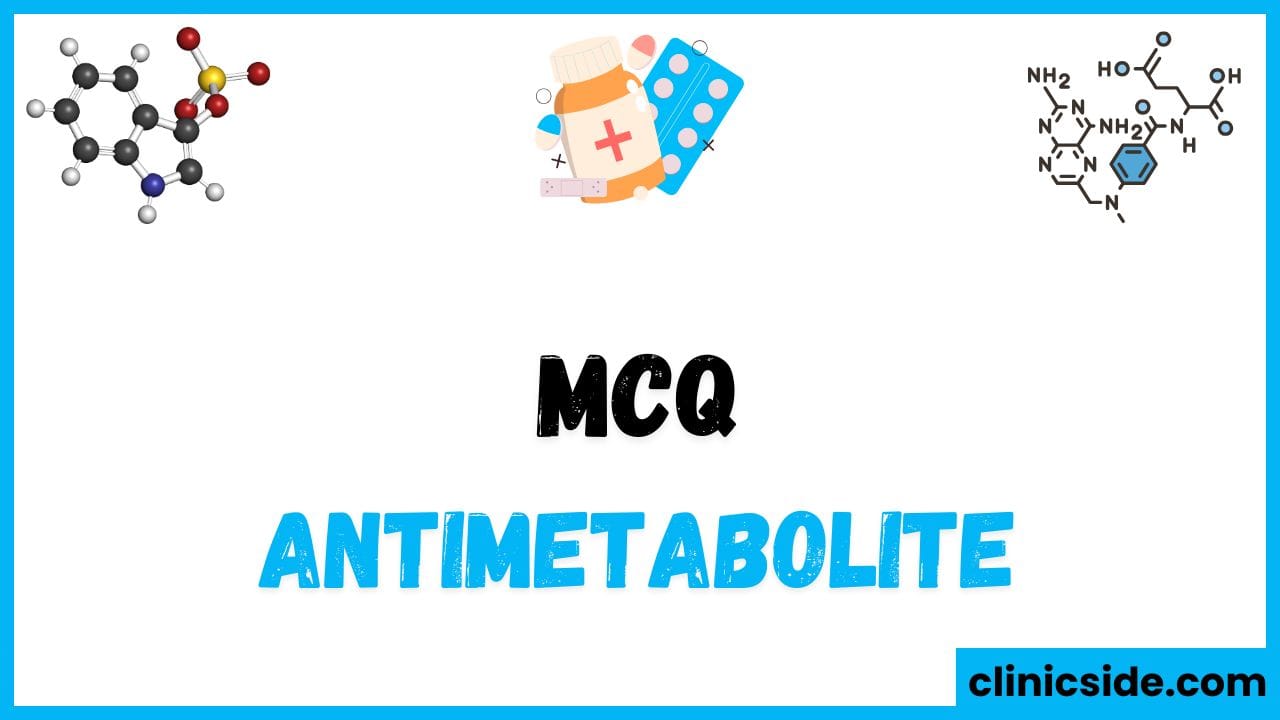Quiz
Available options: 1 to 20
Summary of Antimetabolite Drugs in Cancer Treatment
This summary covers key information from multiple-choice questions (MCQs) related to antimetabolite drugs used in cancer treatment. These MCQs provide insight into the drugs’ mechanisms, therapeutic uses, side effects, and relevant clinical considerations.
Pyrimidine and Purine Analogs
- 5-Fluorouracil (5-FU) is a pyrimidine analog widely used in treating various cancers. It inhibits thymidylate synthase, which is essential for DNA replication, thus preventing cancer cell growth. It is commonly used for cancers like colorectal and breast cancer. Similarly, 6-Mercaptopurine, a purine analog, is particularly effective for chronic myeloid leukemia (CML) and works by inhibiting hypoxanthine-guanine phosphoribosyltransferase (HGPRT), a key enzyme in purine metabolism. This action leads to reduced DNA and RNA synthesis, hindering the proliferation of cancer cells.
Mechanisms of Action
- Methotrexate is a folic acid analog that targets dihydrofolate reductase (DHFR), disrupting the conversion of folic acid into its active form, tetrahydrofolate, which is vital for nucleotide synthesis. This inhibits DNA replication and cell division, making it useful for cancers like acute lymphoblastic leukemia (ALL). Cytarabine, another antimetabolite, inhibits DNA polymerase, which is necessary for DNA replication, thus making it effective in treating acute myeloid leukemia (AML). 5-Fluorouracil blocks thymidylate synthase, disrupting DNA synthesis and causing cancer cells to halt replication.
Clinical Uses
- Methotrexate is used in treating a range of cancers, including ALL, lymphomas, and rheumatoid arthritis in lower doses. Gemcitabine is a treatment for pancreatic cancer, breast cancer, and non-small cell lung cancer. 5-Fluorouracil is employed in treating cancers such as colorectal, gastric, and esophageal cancers, while Cytarabine is essential for treating AML and is often combined with other agents for enhanced efficacy.
Adverse Effects
- The side effects of antimetabolites can be significant. 5-Fluorouracil often causes diarrhea, which can be severe in some patients. Methotrexate can lead to nephrotoxicity (kidney damage), particularly at high doses, necessitating monitoring of renal function. Cytarabine is linked to cerebellar toxicity, which affects coordination and balance. Gemcitabine may cause flu-like symptoms, fatigue, and decreased blood cell counts, while Hydroxyurea can lead to myelosuppression, increasing the risk of infections due to low white blood cell counts.
Rescue Therapy and Support
- Leucovorin is often used to mitigate the toxic effects of methotrexate by supplying the body with an active form of folate, helping to restore DNA synthesis in normal cells. Amifostine and Mesna are other agents used in protecting healthy tissues from chemotherapy-induced damage. Hydroxyurea is beneficial in managing elevated white blood cell counts, particularly in CML.
Drug Interactions
- Methotrexate works well with Leucovorin, which helps reduce toxicity while enhancing the drug’s effectiveness in treating cancer. Hydroxyurea plays a critical role in managing CML by reducing the white blood cell count. 6-Mercaptopurine needs activation through HGPRT to exert its effects, which is important for its effectiveness in cancers reliant on purine metabolism.
Elimination Pathways
- Methotrexate is primarily eliminated via renal excretion, making kidney function an important consideration during treatment to avoid accumulation and toxicity. Other drugs like Gemcitabine and Hydroxyurea undergo liver metabolism and are excreted through the urine.
Prodrugs and Activation
- 6-Mercaptopurine is a prodrug that requires HGPRT for activation. Methotrexate, Cytarabine, and Gemcitabine are not prodrugs, but they still undergo cellular activation to work effectively against cancer cells.
Applications for Solid and Liquid Tumors
- Gemcitabine is notably effective against solid tumors, such as breast, pancreatic, and non-small cell lung cancers. In contrast, Methotrexate and Cytarabine are more commonly used for hematologic cancers like leukemias and lymphomas, targeting rapidly dividing cells that are typical in these malignancies.
Efficacy and Targeted Action
- Antimetabolite drugs are vital in cancer therapy because they selectively target the metabolic processes that are crucial for cancer cell survival and growth. By interfering with DNA replication and synthesis, these agents effectively inhibit cancer cell proliferation, making them central to chemotherapy regimens for both solid and hematologic cancers.
In conclusion, these MCQs underline the critical role of antimetabolite drugs in cancer treatment. Their ability to disrupt cancer cell growth by targeting specific metabolic pathways makes them powerful tools. Careful monitoring and supportive therapies are essential for managing side effects and improving treatment outcomes in patients undergoing chemotherapy with these agents.





